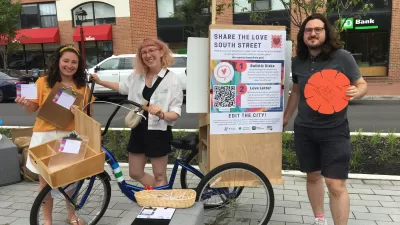Zelda Bronstein makes plenty of points likely to inspire disagreement among planners in this argument calling for a better form of public engagement—one that's substantive and integral, not an afterthought.
Zelda Bronstein expresses frustration with the public outreach process of the San Francisco Planning Department as it considers the Railyard Alternatives and I-280 Feasibility Study. The feasibility study is examining "a proposal to take down I-280 and re-route the former freeway traffic on a boulevard through the neighborhoods, are massive and controversial."
Bronstein acknowledges the controversy inherent in such a drastic proposal, but focuses most intently on the Planning Department's outreach efforts to far, two years into the $1.7 million study. According to Bronstein, a February 23 event "was the first time the community had a chance to weigh in on the project—and the chance it had was paltry."
Bronstein proceeds to describe the format of the presentation as a "Science Fair," by which city planners "mute the public's say in public policy—all while purporting to enhance civic engagement." These practices are not unique to San Francisco or this plan, argues Bronstein, but a symptom, as the headline of the article reads, of planners treating "us like infants."
As an alternative to the "Science Fair" format, and to the pop-up format described in this Planetizen blog post by Dave Briggs (addressed specifically in Bronstein's article), Bronstein suggests that members of the public should be treated equally as the planning officials and other dignitaries working behind closed doors.
FULL STORY: When city planners treat us like infants

Maui's Vacation Rental Debate Turns Ugly
Verbal attacks, misinformation campaigns and fistfights plague a high-stakes debate to convert thousands of vacation rentals into long-term housing.

Planetizen Federal Action Tracker
A weekly monitor of how Trump’s orders and actions are impacting planners and planning in America.

In Urban Planning, AI Prompting Could be the New Design Thinking
Creativity has long been key to great urban design. What if we see AI as our new creative partner?

Chicago’s Ghost Rails
Just beneath the surface of the modern city lie the remnants of its expansive early 20th-century streetcar system.

Baker Creek Pavilion: Blending Nature and Architecture in Knoxville
Knoxville’s urban wilderness planning initiative unveils the "Baker Creek Pavilion" to increase the city's access to green spaces.

Pedestrian Deaths Drop, Remain Twice as High as in 2009
Fatalities declined by 4 percent in 2024, but the U.S. is still nowhere close to ‘Vision Zero.’
Urban Design for Planners 1: Software Tools
This six-course series explores essential urban design concepts using open source software and equips planners with the tools they need to participate fully in the urban design process.
Planning for Universal Design
Learn the tools for implementing Universal Design in planning regulations.
planning NEXT
Appalachian Highlands Housing Partners
Mpact (founded as Rail~Volution)
City of Camden Redevelopment Agency
City of Astoria
City of Portland
City of Laramie





























